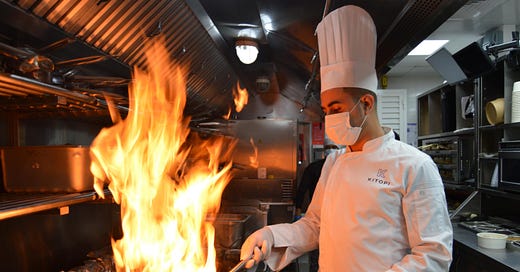Three Regions - Three Models - Three Ghost Kitchen Companies
Decoding Virtual Culinary Frontiers: Side Hustles, Ownership, and Licensing Across Continents
NextBite and Rebel Foods’ operations provide a look at two approaches to fulfillment for virtual brands. NextBite exemplifies what we’ll call the “side hustle model”. The company’s pitch to restaurants is based on them having excess capacity and ingredients. The restaurant’s fryers aren’t running all the time, their employees are sitting around during slow periods. So why not use this extra time to generate a few thousand dollars a month. NextBite sets up a hyper-simplified digital brand consisting of only a couple easily scalable menu items, and the restaurant then cooks them up to hand off to a delivery driver. IHOP now produces a Quesadilla brand. Outback Steakhouse now fulfills a fried chicken shop. NextBite launches the “restaurant” for partners to distribute without any sweat. That’s model one: low effort, relatively low reward.
Rebel Foods, on the other hand, takes the “ownership” approach. Rebel operates hundreds of its own ghost kitchens to fulfill its in-house brands such as Faasos and Mandarin Oak. Their Innovation Center conceptualizes, tests, and tweaks new brands for the market. “Internet restaurants” are then integrated into Rebel’s pan-Indian supply chain and pushed out for delivery via the distributed kitchen network. Model two: controlled and scalable. Recently, however, Rebel’s begun to leak into a third model via their partnership with Wendy’s: “the liscensing model”. Two hundred and fifty virtual Wendy’s will be popping up across India over the next few years - all fulfilled by Rebel. Like a traditional franchise, Rebel produces and distributes all the food and Wendy’s gets a royalty percentage on every Baconator sold for liscencing out its menu.
Champion of the “liscensing model”, however, isn’t headquartered in India or the US. Kitopi is a Dubai based cloud kitchen company taking charge of the fastest growing region for ghost kitchens: the Middle East and North Africa. Outpacing the US in growth by a projected 4% annually, MENA is becoming the center of attention for digital restaurant brands globally. Kitopi’s become the giant in the region through unmatched supply chain and operational efficiency. Whilst Rebel produces seven brands per kitchen, Kitopi produces fifty. That’s fifty unique brands flowing out of a single kitchen. How is that possible? It’s possible because instead of only operating a distributed kitchen network, Kitopi operates distributed kitchen components. In every urban market, Kitopi runs at least one “central kitchen” responsible for sanitizing vegetables, butchering, prepping, mass sauce production, portioning, etc. The products of the central kitchen are then distributed across the city to smaller “finishing kitchens” that assemble the food so it's out the door in eight minutes or less. Yes, fifty brands and eight minutes. Order from any of these brands, and the entire order should be at your door in less than half an hour - all pumped out of the same location. Such efficiency makes Kitopi the gold standard of optimization and is the reason why hundreds of brands are liscensing out their menus to the company for distribution.




